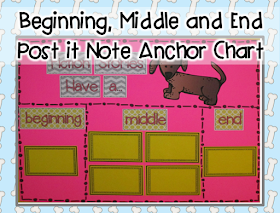Teaching beginning, middle, and end of a fiction text can be fun when you use a wiener dog! We recently worked on beginning, middle and end. I told the kids that as I read the story, I wanted them to thing about which parts of the story were in the beginning, which parts were in the middle, and which parts were in the end. I showed them a picture of a wiener dog and talked about how the head and the tail were short just like the beginning and end of a story. The body of the dog was long, just like the middle of the story.
After I read the whole story, I asked the children to think about what happened at the beginning of the story. I had them turn and talk to their elbow partner. As they talked, I "listened in" to see what they were saying. I called them back together and quickly summarized what I heard them saying. I repeated this process for the middle and the end of the story.
Later that day, we used interactive writing and wrote the things that happened in the beginning, the middle and the end. As I called children to help write on the chart, each child had their own recording sheet to complete.
This is an older version of the recording page.
This is the updated version. I also added a page without lines. This is a great way for your non-text writers to record the beginning, middle and end of the story. This is from the Reading Is Fun unit.
On a third sitting, I read each part aloud to the children. Each time I asked them if it was the beginning, middle or end of the story. Each time we went back to the text to find evidence to support our answers.
After I read each part, I invite the kids to put their hands on their head if they thought it was the beginning of the story, on their belly if they thought it was the middle of the story, and on their "tail" if they thought it was the end of the story.
Here is our finished product.
We then gave the children pieces of paper and their cut to make their own dogs. No patterns....use your brain and think how to cut the paper to make a dog! They glued their beginning, middle and end recording pages to the back of the dogs.
I recently made an
interactive post it chart unit. I love how I can easily make this chart and use it over and over again. Simply record the parts of the story on post it notes. Read each part, invite the children to tell you if it is from the beginning, middle, or end of the story. Go back to the text to find evidence to support your answer.
Here are the units used to write this blog post.
Interactive Post It Note Charts























































